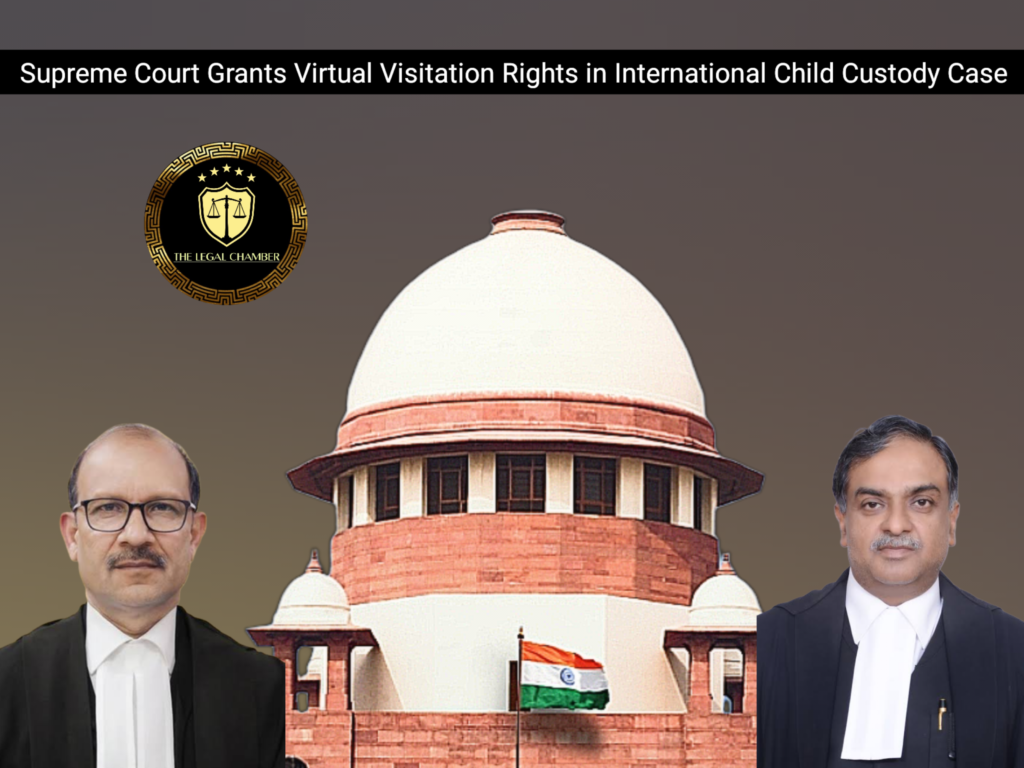
The Supreme Court, prioritizing the child’s welfare as the paramount consideration, granted the appellant-father virtual visitation rights. The Court held that a child has a right to maintain a relationship with both parents, even internationally. It directed regulated video-conferencing sessions to ensure the father remains part of the child’s life without disrupting the child’s settled custody arrangement with the mother.
Facts Of The Case:
The case involves a protracted custody dispute between the appellant-father, Manoj Dhankar, and the respondent-mother, Neeharika, over their minor son. The parties separated in 2017, after which the mother left the matrimonial home with the child. Both parties initiated various legal proceedings, including petitions for divorce and custody. The Family Court initially granted the father limited visitation rights. Subsequently, the parties attempted a settlement and filed for mutual consent divorce, which included a custody agreement, but the compromise ultimately failed. The Family Court later dismissed the father’s custody petition, citing his violation of an interim custody order. Aggrieved, the father appealed to the High Court. During the pendency of this appeal, the mother relocated to Ireland with the child. The High Court subsequently dismissed the father’s appeal, noting his past conduct and the child’s long-term residence with the mother. Before the Supreme Court, the father limited his prayer solely to securing virtual visitation rights, forgoing his claim for physical custody.
Procedural History:
The procedural history of the case commenced with the appellant-father filing for custody under the Guardians and Wards Act, 1890 before the Family Court, which granted interim visitation but ultimately dismissed his petition for violating the order’s terms. The appellant then challenged this dismissal before the Punjab & Haryana High Court in an appeal (FAO No. 2655 of 2023). During the pendency of this appeal, the respondent-mother relocated the child to Ireland, prompting the appellant to file interim applications seeking the child’s itinerary and interaction. The High Court, however, limited its intervention to the disclosure of the itinerary. After the Supreme Court dismissed a Special Leave Petition against this limited order, the High Court proceeded to dismiss the main appeal, leading the appellant to file the present appeal before the Supreme Court, which was entertained after granting leave.
READ ALSO:Supreme Court Explains When It Can’t Be Trusted :Dying Declaration Sole Basis for Conviction?
Court Observation:
The Court observed that the child’s welfare is the paramount consideration in such disputes, and the central question is not the rights of the parents but the arrangement that best serves the child’s emotional, mental, and physical well-being. It noted that while the conduct of both parents had been less than ideal, the child, who was settled with his mother in Ireland, should not be disturbed. The Court emphasized that every child has a fundamental right to the affection and relationship of both parents, and denying contact would deprive the child of the father’s love and emotional support. It, therefore, found the father’s limited request for virtual interaction to be fair, reasonable, and necessary to balance the child’s settled living situation with the need to maintain a parental bond.
Final Decision & Judgement:
The Supreme Court allowed the appeal in part and issued a final judgement granting the appellant-father specific virtual visitation rights. The Court directed that the father is entitled to interact with his son through video-conferencing for two hours on every alternate Sunday, from 10:00 AM to 12:00 noon Ireland time. It mandated that both parties must cooperate in good faith to ensure the smooth implementation of this arrangement without any obstruction or hostility. The Court further ordered that any technical or logistical difficulties in conducting the video sessions must be resolved mutually between the parties, always keeping the paramount interest of the child at the forefront. With these directions, the appeal was disposed of.
Case Details:
Case Title: Manoj Dhankar vs Neeharika & Ors. Citation: 2025 INSC 1068 Appeal Number: Civil Appeal No. 11332 of 2025 Date of Judgement: September 2, 2025 Judges/Justice Name: Justice Vikram Nath and Justice Sandeep Mehta